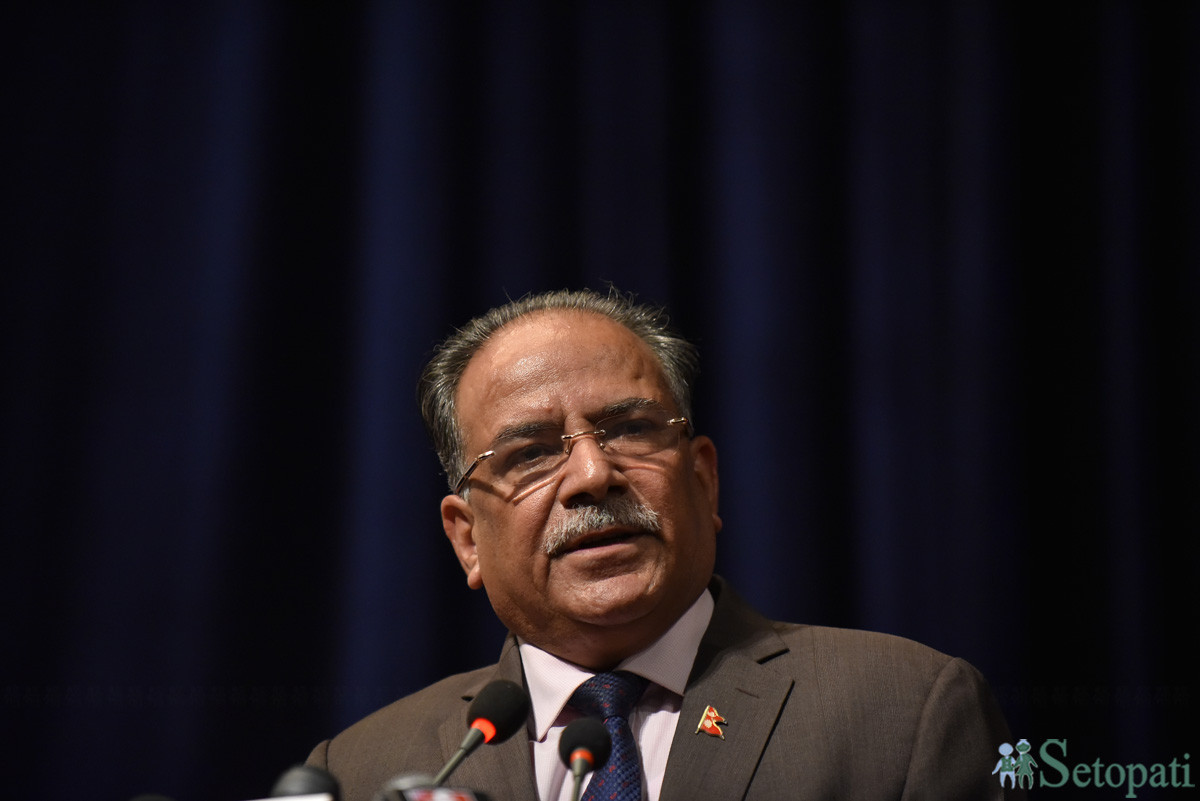CPN (Maoist) Center Chairman Pushpa Kamal Dahal has asked eight questions in the application for review of the Supreme Court (SC) verdict that invalidated his party's unification with CPN-UML.
The joint bench of Justices Bam Kumar Shrestha and Kumar Regmi on March 7 had invalidated the unification of CPN-UML and CPN (Maoist) Center reinstating the two parties to their status on the day of unification while ruling in the dispute about the name of party formed after unification of UML and Maoist Center.
Rishiram Kattel had moved the SC arguing that the party formed after unification of UML and Maoist Center cannot be called Communist Party of Nepal (CPN) as the party is registered with the Election Commission in his name.
The SC ruled that Communist Party of Nepal belongs to Rishiram Kattel but went further and invalidated the unification of the two parties.
The first question Dahal has asked in the application for review is whether the name of Communist Party of Nepal (CPN) resembles the Communist Party of Nepal led by Kattel.
The second is, whether the dispute is for the name or existence of the party? Can existence of any party be rejected while deciding about the dispute about name of any registered party.
The third asks whether name alone is necessary for party registration or party flag, election symbol, statute, ideology and objectives apart from name also have relevance. Can existence of the party be terminated merely due to dispute about name when other things remain.
The fourth asks whether the parties can be reinstated to the state before unification without giving an opportunity to correct the name.
The fifth asks whether the court can reject unification and existence of the unified party on its own when the petitioner has not demanded that unification should be annulled.
The sixth refers to the SC accepting unification in the verdict on House dissolution and asks whether the SC in another verdict after that can say the two parties are separate, and if such verdict contravenes the verdict by the Constitutional bench of the SC.
The seventh asks can registration of Communist Party of Nepal (CPN) be annulled and its existence ended and whether that violates the Constitution and is tantamount to ban on parties.
The eighth asks whether the SC has not entered political issue while issuing the verdict in a way that unification itself is annulled, and adds whether the court can cross the boundary of such legal issues and enter such political territory.
Dahal through these questions has argued that the SC verdict is unnatural, unfair and political. He mentions that the verdict has raised questions about status of the representatives elected after unification.
He has argued that it is against the people's mandate and contravenes the verdict of the Constitutional bench including five justices, and claimed that the verdict about annulling unification has come to serve someone's political interests.
"The SC had given verdict on a subject that was not demanded. The SC cannot demolish internal unity of parties. Such verdicts have been reviewed even before," Dahal told reporters after applying for review of the verdict. "I hope this verdict will also be corrected."
Dahal reached the Apex Court with Maoist leaders including Barsha Man Pun, Janardan Sharma, Haribol Gajurel, Giriraj Mani Pokharel and others Tuesday.
The name Communist Party of Nepal, that UML and the Maoists chose after unification, was found already registered with the Election Commission. The Election Commission had then registered the unified ruling party as Communist Party of Nepal (CPN).
Kattel had first complained with the Election Commission and then moved the SC in December 2018 against the decision.
The Communist Party of Nepal registered with Kattel as chairman had even contested the last general election with hammer and spade as the election symbol. The party had also contested the last local election before the general election.
The name has been registered with the Election Commission for three decades.
The group of erstwhile Maoists led by Netra Bikram Chand also uses the name for its party.
Clause 6(e) of the Act about political parties prohibits registration of any party with the Election Commission if the name or election symbol matches with a party already registered with the Election Commission.

